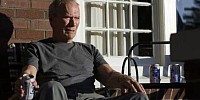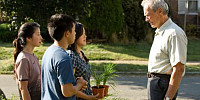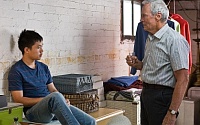 Just no pussyfooting
Just no pussyfootingClint Eastwood takes us for a ride in his Gran Torino
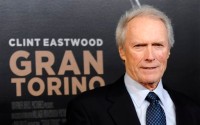
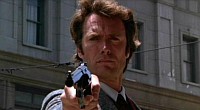
CLINT EASTWOOD
31.May.30, San Francisco

 Clint Eastwood is a cinematic icon both in front of and behind the camera. His two films in 2008 both earned huge amounts of respect - Changeling for its wrenching portrayal of a woman (Oscar-nominated Angelina Jolie) on the wrong side of justice in 1920s Los Angeles, and Gran Torino for its astute look at the changing face of immigration in society. And he cast himself in the lead role in Gran Torino as a character who's like an older version of one of his most famous screen personas, "Dirty" Harry Callahan.
Clint Eastwood is a cinematic icon both in front of and behind the camera. His two films in 2008 both earned huge amounts of respect - Changeling for its wrenching portrayal of a woman (Oscar-nominated Angelina Jolie) on the wrong side of justice in 1920s Los Angeles, and Gran Torino for its astute look at the changing face of immigration in society. And he cast himself in the lead role in Gran Torino as a character who's like an older version of one of his most famous screen personas, "Dirty" Harry Callahan.But at age 78, Eastwood says this may be his last role in front of the camera. So why go back to acting now, after a four-year break?
Eastwood: There are not that many good roles for guys my age. After Million Dollar Baby, I thought, "That's enough now." And I didn't want to act again. But it's a role that was my age. And the timing was right for me. I was in the final stage of Changeling, doing the scoring. And I did not want to wait.
Was it difficult to become an actor again?
It was okay. I have been doing it for 55 years. It's like anything: you get the character in mind and then you're there doing it. And I was happy to get back in front of the camera. It was fun to play such a bizarre character.
So what is it about Walt Kowalski?
I think everybody would like to be him for 10 minutes. I liked the fact he was kind of crazy and an equal-opportunity insulter, a unique character I thought I knew well. Growing up, I knew a lot of people like that. It seems in that era nobody was scared to say what they thought. This is a guy who is a Korean War veteran, whose wife just passed away at the beginning of the story. He's estranged from his two adult sons who he thinks have counted him out. The grandkids don't want to hang out either, except if they might inherit something from him. Most of his friends have died. He has worked at the Ford Motor Company for 50 years and his neighborhood, which used to be all automobile people, has been taken over by immigrants. And he doesn't like the changes that he sees.
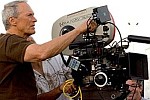
I just don’t want to copy the current trends or do movies for teenagers
Did it bother you to play such a racist man?
The trap would have been to go soft with it. If you don't play it all the way, then it becomes a Hollywood bailout. And if you're going to play this kind of guy, you've got to go all the way. You cannot be Mr Nice Guy. It is very non-politically correct and that's good. There's just no pussyfooting around it. He's definitely a racist, but he learns a certain amount of tolerance along the way through his forced relationships with the Hmong family who lives next door and whom he despises at the beginning. It changes when he turns around and stars helping them out, trying to save the young kid, Thao, from the gang life, and teaching him ambition, ethics, morals.
You mainly chose non-professional actors.
I got young people - 17 or 18 years old - who had never acted before, but they were really good and brought a certain realistic feel to it. Bee Vang, who plays Thao, is very smart and somewhat unselfconscious, which helped because his character is that way too. I tried to give them a lot of freedom. I told them they don't have to stick to the words literally. And when they spoke in Hmong, I didn't know what they said anyway. I just tried to get them in the mood and told them not to think too much - to let it come up from instinct.
Your recent films deal with fairly dark subject matter.
It just happens. I always like to try different things, different genres; stories that have a dramatic element and can generate conflict, which I find appealing, where the characters have to overcome obstacles. That kind of thing is challenging. I don't necessarily look for dark themes; they just seem to appear. But they usually are stories on the dark side, like the two war pictures, Flags of Our Fathers and Letters From Iwo Jima, Mystic River and Million Dollar Baby, and Changeling. I just don't want to copy the current trends or do movies for teenagers. I want people to get more out of movies. I think there are a lot of good little messages in this film about relationships with the church and with friends and cultures people are prejudiced against.
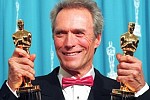
If you’ve done the best you can, you feel pretty good about it
No. One day you wake up and you are 78 years old. I said to my wife Dina the other day, talking about Changeling and Gran Torino, "What am I doing? I am doing two pictures in a row and I am writing music. What the hell am I doing it for?" Then I start laughing. It's because I like it, and I can learn something new along the way.
You mentioned that you've been acting for 55 years. What's been the highlight of your career?
Just the fact that I was able to control my own destiny, so to speak. When I started directing in 1970, not a lot of actors were doing it. It seems at that time that it was a harder jump. I knew that with [my first film as director] Play Misty for Me, I had to prove myself, to show the studio that I could make a decent film out of it. It worked out pretty good.
How do you feel when people call you an icon or a legend?
It's fine. It's very nice. I'd rather be called that than something else less flattering. The main thing is to do each project the way you want, and if they find an audience, that's terrific. And if they don't, there's nothing you can do anyway, so don't let it concern you that much. An awful lot of good movies have done badly and an awful lot of bad movies have done very well. There are no real rhymes or reasons for it. Sometimes the stars don't always align right. But if you've done the best you can, you feel pretty good about it.
Your 30th film as a director is a Nelson Mandela biopic with Morgan Freeman and Matt Damon. How's that coming together?
It will be a political drama and a rather unique story in the way Nelson Mandela could think of using the Rugby World Cup in 1995 and South Africa's broken-down national team, the Springboks, one year after he became president, to unite a nation - the way he went about spreading pride in the country, and the way it helped him solve the problems. It'll have a lot of scope. It has a lot of games and elements to it. It's too early to know if it's going to be any good, but I'll just do the best I can.
Thanks to Jenna Knight at Hyperlaunch • FEB.09
HOME | REVIEWS | AWARDS | NEWS | FESTIVAL | Q&A | ABOUT | TALKBACK
